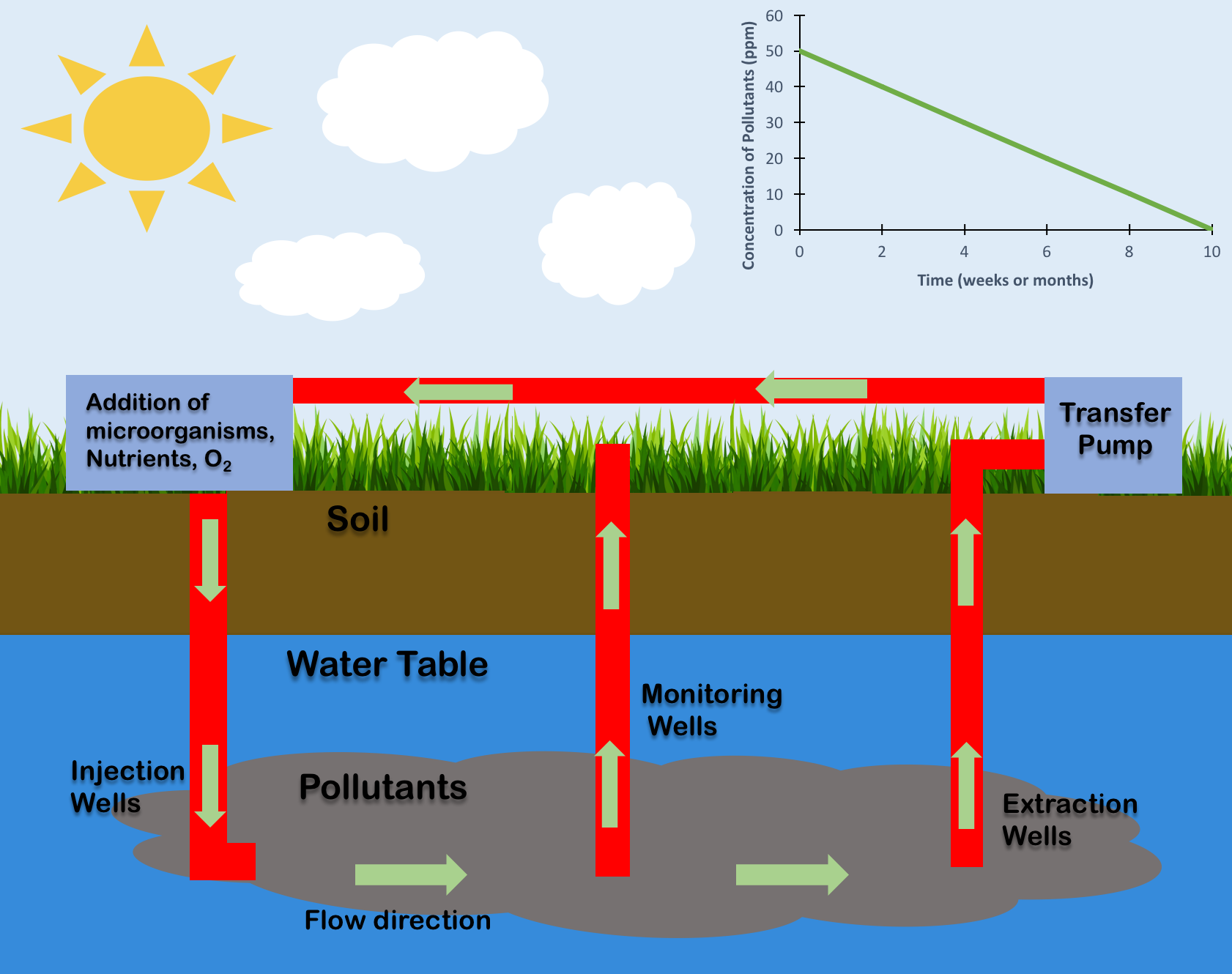|
Land Treatment Unit
A land treatment unit (LTU) is a location in which land is treated, usually through bioremediation processes, to reduce the toxicity of the soil. Land treatment units are areas where hazardous waste Hazardous waste is waste that has substantial or potential threats to public health or the environment. Hazardous waste is a type of dangerous goods. They usually have one or more of the following hazardous traits: ignitability, reactivity, co ... is applied or incorporated into the soil surface. Land treatment units are typically units consisting of natural soils where natural biological and chemical degradation and attenuation processes immobilize, transform, or degrade hazardous constituents over time. [...More Info...] [...Related Items...] OR: [Wikipedia] [Google] [Baidu] |
Bioremediation
Bioremediation broadly refers to any process wherein a biological system (typically bacteria, microalgae, fungi, and plants), living or dead, is employed for removing environmental pollutants from air, water, soil, flue gasses, industrial effluents etc., in natural or artificial settings. The natural ability of organisms to adsorb, accumulate, and degrade common and emerging pollutants has attracted the use of biological resources in treatment of contaminated environment. In comparison to conventional physicochemical treatment methods bioremediation may offer considerable advantages as it aims to be sustainable, eco-friendly, cheap, and scalable. Most bioremediation is inadvertent, involving native organisms. Research on bioremediation is heavily focused on stimulating the process by inoculation of a polluted site with organisms or supplying nutrients to promote the growth. In principle, bioremediation could be used to reduce the impact of byproducts created from anthropogenic acti ... [...More Info...] [...Related Items...] OR: [Wikipedia] [Google] [Baidu] |
Toxicity
Toxicity is the degree to which a chemical substance or a particular mixture of substances can damage an organism. Toxicity can refer to the effect on a whole organism, such as an animal, bacterium, or plant, as well as the effect on a substructure of the organism, such as a cell ( cytotoxicity) or an organ such as the liver (hepatotoxicity). By extension, the word may be metaphorically used to describe toxic effects on larger and more complex groups, such as the family unit or society at large. Sometimes the word is more or less synonymous with poisoning in everyday usage. A central concept of toxicology is that the effects of a toxicant are dose-dependent; even water can lead to water intoxication when taken in too high a dose, whereas for even a very toxic substance such as snake venom there is a dose below which there is no detectable toxic effect. Toxicity is species-specific, making cross-species analysis problematic. Newer paradigms and metrics are evolving to bypas ... [...More Info...] [...Related Items...] OR: [Wikipedia] [Google] [Baidu] |
Soil
Soil, also commonly referred to as earth or dirt, is a mixture of organic matter, minerals, gases, liquids, and organisms that together support life. Some scientific definitions distinguish ''dirt'' from ''soil'' by restricting the former term specifically to displaced soil. Soil consists of a solid phase of minerals and organic matter (the soil matrix), as well as a porous phase that holds gases (the soil atmosphere) and water (the soil solution). Accordingly, soil is a three-state system of solids, liquids, and gases. Soil is a product of several factors: the influence of climate, relief (elevation, orientation, and slope of terrain), organisms, and the soil's parent materials (original minerals) interacting over time. It continually undergoes development by way of numerous physical, chemical and biological processes, which include weathering with associated erosion. Given its complexity and strong internal connectedness, soil ecologists regard soil as an ecosystem. Most ... [...More Info...] [...Related Items...] OR: [Wikipedia] [Google] [Baidu] |
Hazardous Waste
Hazardous waste is waste that has substantial or potential threats to public health or the environment. Hazardous waste is a type of dangerous goods. They usually have one or more of the following hazardous traits: ignitability, reactivity, corrosivity, toxicity. Listed hazardous wastes are materials specifically listed by regulatory authorities as hazardous wastes which are from non-specific sources, specific sources, or discarded chemical products. Hazardous wastes may be found in different physical states such as gaseous, liquids, or solids. A hazardous waste is a special type of waste because it cannot be disposed of by common means like other by-products of our everyday lives. Depending on the physical state of the waste, treatment and solidification processes might be required. The Basel Convention on the Control of Transboundary Movements of Hazardous Wastes and Their Disposal was signed by 199 countries and went into force in 1992. Plastic was added to the convention i ... [...More Info...] [...Related Items...] OR: [Wikipedia] [Google] [Baidu] |
Land Disposal Unit
A land disposal unit, or LDU, is a site in which hazardous waste is remedied through natural and man-made processes. "Land disposal" of hazardous waste is defined in the U.S. Resource Conservation and Recovery Act (RCRA). Types of LDUs for hazardous waste disposal: * Landfill * Surface impoundment * Waste pile * Land treatment unit * Injection well An injection well is a device that places fluid deep underground into porous rock formations, such as sandstone or limestone, or into or below the shallow soil layer. The fluid may be water, wastewater, brine (salt water), or water mixed with indus ... * Salt dome formation * Salt bed formation * Mine * Cave. References Land disposal unit Waste legislation in the United States Waste treatment technology {{waste-stub ... [...More Info...] [...Related Items...] OR: [Wikipedia] [Google] [Baidu] |

